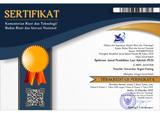The Individual Characteristics and Business Potential of Participant on Life Skills Education Program (PKH) in PKBM
 ), Wisroni Wisroni(2),
), Wisroni Wisroni(2), (1) Universitas Negeri Padang
(2) Universitas Negeri Padang
 Corresponding Author
Corresponding Author
DOI : https://doi.org/10.24036/spektrumpls.v2i1.103662
Full Text:
 Language : en
Language : en
Abstract
The purpose of this study is to describe the personal characteristics of students (learning citizens) and the business potential that is relevant to life skills education programs at the Community Learning Center in Tanah Datar District. This study uses a descriptive quantitative survey method. This study uses 60 samples from 120 population people. Furthermore, the data were analyzed quantitatively descriptive, then clarified with the focus of group discussion (FGD), interviews, observation and verification of documentation. The results showed that participants in the life skills education program in several Community Learning Centers in Tanah Datar District were generally of productive age with adequate formal education (high school level), from pre-prosperous families, and did not have a permanent business. Based on the search for interests, existing skills, and other environmental resource potentials, the appropriate business developed in the future is a business that produces goods from the agricultural sector and goods from business dress, sewing or embroidery skills.
Keywords: Life Skills Education, Personal Characteristics, Business Potential
References
Anwar. (2006). Pendidikan Kecakapan Hidup (Life Skill Education). Bandung: Alfabeta.
Badan Pusat Statistik. (2017). Provinsi Sumatera Barat dalam Angka Tahun 2016. Padang: Badan Pusat Statistik.
Bartin, T. (2010). Profil Usaha dan Persepsi Pelaku Usaha Mikro dan Kecil terhadap Kompetensi dan Kinerja Pamong Belajar dalam Pelaksanaan Program Kecakapan Hidup: Kasus Pengrajin Industri Rumah Tangga Binaan Sanggar Kegiatan Belajar di Provinsi Sumatera Barat. Jurnal Teknodik, 14(2).
Desmawati, L., Suminar, T., & Budiartati, E. (2017). Penerapan Model Pendidikan Kecakapan Hidup pada Program Pendidikan Kesetaraan di Kota Semarang. EDUKASI, 2(1). Retrieved from https://journal.unnes.ac.id/nju/index.php/edukasi/article/download/968/905
Prasetyo, I., Tohani, E., & Sumarno. (2013). Pengembangan Mode Pendidikan Life Skills Berbasis Kewirausahaan melalui Experiential Learning. Jurnal Ilmiah VISI PTK-PNF, 8(2), 94–103. https://doi.org/https://doi.org/10.21009/JIV.0802.2
Rafiah, R. (2017). Pengelolaan Usaha Kecil dan Menengah (UKM) Berbasis Manajemen Pendidikan Nonformal di “Kampung Kue” Kelurahan Kalirungkut Kota Surabaya. J+PLUS UNESA, 6(3). Retrieved from http://jurnalmahasiswa.unesa.ac.id/index.php/jurnal-pendidikan-luar-sekolah/article/view/21872
Solfema. (2017). Model Pelatihan Kewirausahaan bagi Perempuan Berekonomi Lemah dengan Berbasis Potensi Lokal di Kota Padang (Laporan Penelitian). Padang.
Sumodiningrat, G. (1999). Pemberdayaan Masyarakat dan Jaring Pengaman Sosial. Jakarta: Gramedia Pustaka Utama.
Supriatna, M. (2012). Pengembangan Kecakapan Hidup di Sekolah (Makalah). Bandung.
Syahyuti. (2006). Tiga Puluh Konsep Penting dalam Pembangunan Pedesaan dan Pertanian. Jakarta: Penerbit PT Bina Rena Pariwara.
Triady, M. S., Lantu, D. C., Ghazali, A., & Utami, A. F. (2016). Pengembangan Model Peningkatan Daya Saing UMKM di Indonesia: Validasi Kuantitatif Model. Jurnal Manajemen Teknologi, 15(1), 77–93. https://doi.org/10.12695/jmt.2016.15.1.6
 Article Metrics
Article Metrics
 Abstract Views : 341 times
Abstract Views : 341 times
 PDF Downloaded : 126 times
PDF Downloaded : 126 times
Refbacks
- There are currently no refbacks.

This work is licensed under a Creative Commons Attribution-NonCommercial 4.0 International License.



